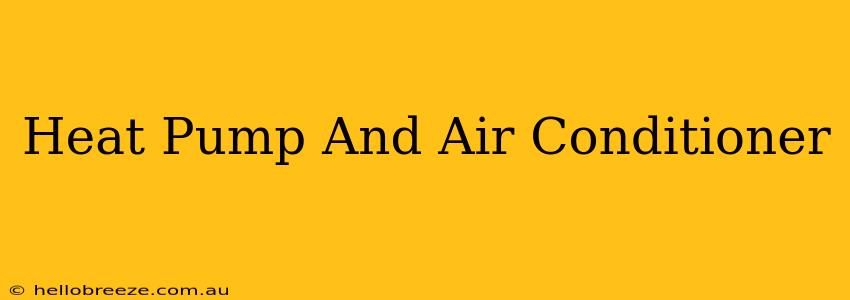Choosing between a heat pump and an air conditioner can be confusing. Both systems manage temperature, but they operate differently and have distinct advantages and disadvantages. This guide will break down the key differences to help you make the best decision for your home and budget.
Understanding Heat Pumps
Heat pumps are highly efficient heating and cooling systems that move heat rather than generating it. In the summer, they extract heat from inside your home and release it outside, providing cooling. In the winter, they reverse this process, drawing heat from the outside air (even in freezing temperatures) and transferring it inside to warm your home.
Advantages of Heat Pumps:
- Energy Efficiency: Heat pumps are significantly more energy-efficient than traditional heating systems like furnaces, especially in milder climates. They can reduce your energy bills considerably.
- Two-in-One System: One unit handles both heating and cooling, simplifying your HVAC system and reducing maintenance needs.
- Environmentally Friendly: Heat pumps use less energy, resulting in a smaller carbon footprint compared to systems relying solely on electricity for heating.
- Quiet Operation: Many heat pumps operate more quietly than traditional air conditioners or furnaces.
Disadvantages of Heat Pumps:
- Performance in Extreme Cold: While modern heat pumps perform well in moderately cold climates, their efficiency can decrease in extremely frigid temperatures. Supplemental heating might be necessary in very cold regions.
- Higher Initial Cost: The upfront cost of installing a heat pump can be higher than that of a standard air conditioner and furnace.
- Installation Requirements: Proper installation is crucial for optimal performance. Consult a qualified HVAC professional.
Understanding Air Conditioners
Air conditioners are cooling-only systems that work by extracting heat and moisture from indoor air and releasing it outdoors. They are primarily used for summer cooling and require a separate heating system, such as a furnace or boiler, for winter warmth.
Advantages of Air Conditioners:
- Lower Initial Cost: Air conditioners typically have a lower upfront purchase and installation cost compared to heat pumps.
- Simplicity: They are simpler systems with fewer moving parts, potentially leading to lower maintenance costs.
- Proven Technology: Air conditioning technology is well-established and readily available.
Disadvantages of Air Conditioners:
- Higher Energy Costs (Heating): If you rely on electric resistance heating (common with air conditioners), your winter heating bills will likely be significantly higher than with a heat pump.
- Separate Heating System Needed: You'll need a separate heating system, increasing complexity and cost.
- Less Energy Efficient Overall: Air conditioners consume more energy than heat pumps for both cooling and heating (if using electric resistance).
Heat Pump vs. Air Conditioner: The Verdict
The best choice depends on your specific needs and climate:
- Milder Climates: Heat pumps are generally the more economical and environmentally friendly choice. Their superior efficiency translates to significant long-term savings.
- Extremely Cold Climates: A combination of a heat pump and a supplemental heating system (like a furnace) might be necessary to ensure adequate warmth during the coldest months. In these cases, a careful cost-benefit analysis is crucial.
- Budget Constraints: If your budget is tight, an air conditioner might seem more attractive initially, but the long-term energy costs should be carefully considered.
Ultimately, consulting with a qualified HVAC professional is essential for determining the optimal system for your home and ensuring a proper installation. They can assess your home's specific needs, climate, and energy usage patterns to provide personalized recommendations. Don't hesitate to ask questions and compare quotes from different contractors to make an informed decision.

